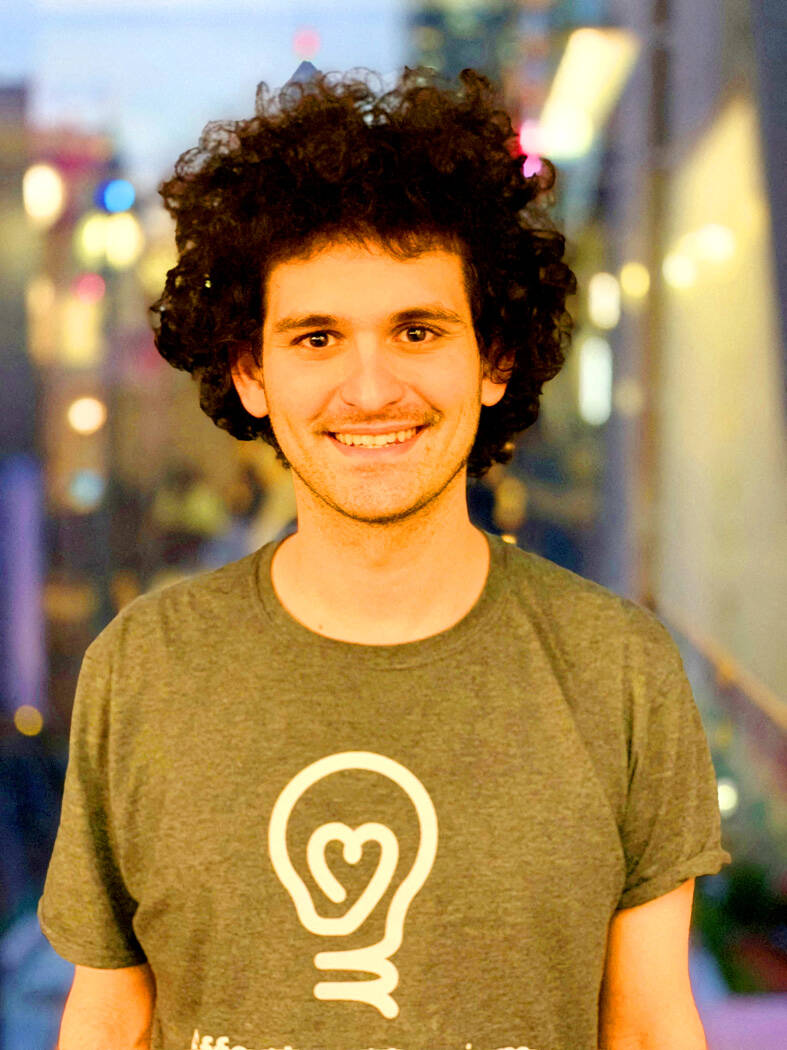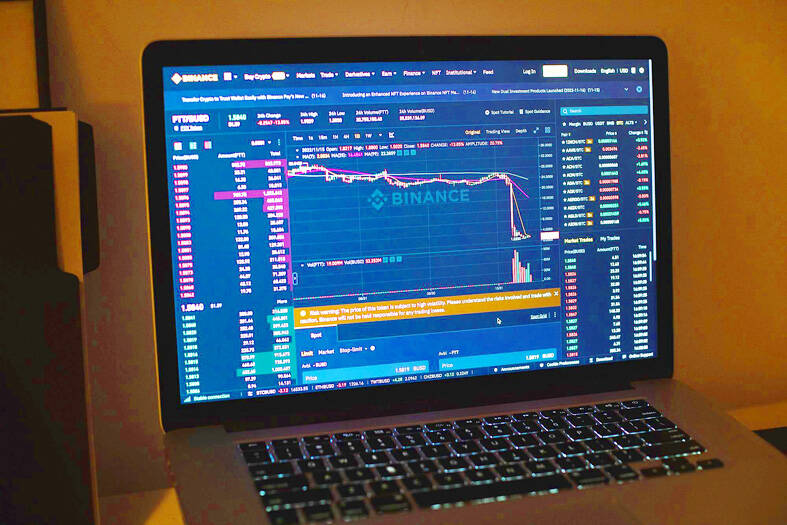Even as some of Wall Street’s old guard has an “I-told-you-so” moment after the collapse of Sam Bankman-Fried’s FTX Group, futures exchanges are not giving up on cryptocurrencies.
CME Group Inc chief executive officer Terry Duffy, who has been one of the FTX cofounder and former CEO’s fiercest critics, said he would not stop cryptocurrency futures trading just because of “one bad actor.”
Cboe Global Markets, another Chicago-based exchange, and software provider Trading Technologies also recommitted to digital assets in the wake of the FTX meltdown.

Photo: Reuters
“I’m not prepared to say I’d delist it,” Duffy, 64, last week said in an interview, in which he recalled his spat with Bankman-Fried at an industry event in March.
“We’ve been at the cutting edge of innovative products, but what we don’t do is do it in a reckless manner,” Duffy said.
The bankruptcy of FTX potentially caused billions of US dollars in losses for millions of account holders and sparked investigations into allegations of wrongdoing. It has also ensnared one of the biggest cryptocurrency lenders, Genesis Global Trading Inc, as well as Gemini Trust Co, which halted redemptions, and BlockFi Inc — a lender previously bailed out by FTX.

Photo: Bloomberg
“These events reinforce our strategy,” Chris Isaacson, chief operating officer and chair of Cboe’s digital board, said in an interview on Friday. “If there is ever a time where trust in markets needs to be built and reinforced in digital assets, it’s now. That’s what we’re committed to doing.”
Isaacson said Cboe would continue with crypto futures trading.
Trading Technologies executive vice president of product management Jason Shaffer said his firm would stay the course as well, and that customers want to engage in crypto in the same way they trade other currencies.
At a Futures Industry Association (FIA) event last week, attendants compared FTX’s collapse to energy trader Enron Corp, which went under in 2001 and became a symbol of corporate fraud.
PARALLELS TO 2008
US Commodity Futures Trading Commission (CFTC) Commissioner Christy Goldsmith Romero went as far as to draw parallels to the worldwide financial crisis.
“Opaque, complex, leveraged, unregulated products, highly interconnected market, concerns about the quality of underlying assets, high potential for contagion risk — these are the types of things that existed in 2008 that I see parallels with now,” she said.
Bankman-Fried was a driving force behind a failed campaign to penetrate traditional finance. He proposed handling every step in a cryptocurrency derivative transaction: clearing trades and eliminating the intermediaries who in many cases help spread the risk.
If approved by the CFTC, the plan could have increased risks for the traditional industry and disrupted business models like CME’s that have been around since the late 1800s.
The plan drew attacks from Wall Street firms and heightened calls for more oversight of Bankman-Fried’s firm and its rivals.
The idea was “rubbish from Day 1,” Duffy said.
“I’m surprised so many people were enamored by his nonsense,” she said.
Another critic of the plan was Intercontinental Exchange Inc founder and CEO Jeff Sprecher.
“Generally speaking, you can’t have an exchange, a market maker and a clearing settlement organization under one roof,” Sprecher told the FIA event.
Bankman-Fried, 30, has been a key donor to the Democratic Party.
He gave nearly US$40 million to candidates in the past two years, nearly all to Democrats, and has visited US lawmakers in an effort to affect developing cryptocurrency regulations.
Duffy said he hoped politicians who received the donations from Bankman-Fried would return them.
“I never bought into the whole thing,” he said.
Sprecher said that politicians who accepted his money would be quick to show that “they are not influenced by that.”
Regulators are probing whether Bankman-Fried and his associates misused customer funds, and his company’s collapse is adding urgency to a Washington push to transform the CFTC into a top cryptocurrency watchdog, CFTC Chairman Rostin Behnam said in an interview on the sidelines of the FIA event.
While the industry might take a breather for now, it would come back when confidence is restored, said Ram Vittal, North America CEO at Marex Group, a futures and options broker that has a partnership with Coinbase Global Inc.
“What is the ingredient that will be the spark?” Vittal asked. “The proper regulatory framework that allows everybody a lot more conviction so that some of these FTX-like things don’t happen.”

PROTECTION: The investigation, which takes aim at exporters such as Canada, Germany and Brazil, came days after Trump unveiled tariff hikes on steel and aluminum products US President Donald Trump on Saturday ordered a probe into potential tariffs on lumber imports — a move threatening to stoke trade tensions — while also pushing for a domestic supply boost. Trump signed an executive order instructing US Secretary of Commerce Howard Lutnick to begin an investigation “to determine the effects on the national security of imports of timber, lumber and their derivative products.” The study might result in new tariffs being imposed, which would pile on top of existing levies. The investigation takes aim at exporters like Canada, Germany and Brazil, with White House officials earlier accusing these economies of

EARLY TALKS: Measures under consideration include convincing allies to match US curbs, further restricting exports of AI chips or GPUs, and blocking Chinese investments US President Donald Trump’s administration is sketching out tougher versions of US semiconductor curbs and pressuring key allies to escalate their restrictions on China’s chip industry, an early indication the new US president plans to expand efforts that began under former US president Joe Biden to limit Beijing’s technological prowess. Trump officials recently met with their Japanese and Dutch counterparts about restricting Tokyo Electron Ltd and ASML Holding NV engineers from maintaining semiconductor gear in China, people familiar with the matter said. The aim, which was also a priority for Biden, is to see key allies match China curbs the US

Teleperformance SE, the largest call-center operator in the world, is rolling out an artificial intelligence (AI) system that softens English-speaking Indian workers’ accents in real time in a move the company claims would make them more understandable. The technology, called accent translation, coupled with background noise cancelation, is being deployed in call centers in India, where workers provide customer support to some of Teleperformance’s international clients. The company provides outsourced customer support and content moderation to global companies including Apple Inc, ByteDance Ltd’s (字節跳動) TikTok and Samsung Electronics Co Ltd. “When you have an Indian agent on the line, sometimes it’s hard

‘SACRED MOUNTAIN’: The chipmaker can form joint ventures abroad, except in China, but like other firms, it needs government approval for large investments Taiwan Semiconductor Manufacturing Co (TSMC, 台積電) needs government permission for any overseas joint ventures (JVs), but there are no restrictions on making the most advanced chips overseas other than for China, Minister of Economic Affairs J.W. Kuo (郭智輝) said yesterday. US media have said that TSMC, the world’s largest contract chipmaker and a major supplier to companies such as Apple Inc and Nvidia Corp, has been in talks for a stake in Intel Corp. Neither company has confirmed the talks, but US President Donald Trump has accused Taiwan of taking away the US’ semiconductor business and said he wants the industry back